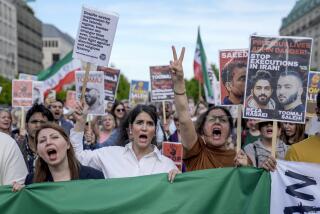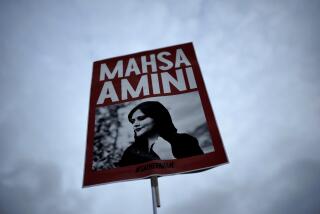Opposition leader denounces Iran’s crackdown
- Share via
Reporting from Beirut — Defying publicly aired demands for his execution, Iran’s leading opposition figure today issued a scathing denunciation of the government’s violent crackdown against his supporters, calling for a restoration of civil liberties as a way of ending what he described as a “serious crisis” that has destabilized the nation.
Mir Hossein Mousavi’s statement, posted to reformist websites this morning, were his first public comments since a violent weekend of protests coinciding with an important religious holiday. Mousavi’s 43-year-old nephew, Ali Habibi-Mousavi, was shot dead during the unrest and buried Wednesday morning.
Mousavi said threats against his life would not deter him.
“I’m not afraid of being one of the post-election martyrs who lost their lives in their struggle for their rightful demands,” he wrote in his first major public statement in weeks.
“My blood is not redder than that of other martyrs.”
Iranian authorities describe the unrest as a foreign-backed plot meant to weaken the Islamic Republic, which is under international pressure for its drive to master nuclear technology. Iranian security forces have arrested at least 1,300 people in Iran and other cities in the week and a half of unrest that began with the Dec. 19 death of dissident cleric Ayatollah Hossein-Ali Montazeri, according to the opposition news website.
Plainclothes security officials and Basij militiamen have stormed the homes and offices of dissident clerics and activists. Hard-line clerics loyal to Supreme Leader Ali Khamenei have labeled the protesters and opposition leaders mohareb, or “enemies of God,” an Islamic offense punishable by death.
“These people are flagrant examples of corrupt on earth and we punished the likes of them in the early days of the revolution,” Ayatollah Ahmad Jannati told worshipers today at Friday prayers, possibly referring to the mass execution of the Islamic Republic’s opponents during the 1980s.
“Security and intelligence bodies should accomplish their tasks to arrest norm-breakers quickly for trial,” said Jannati, who heads the Guardian Council, the powerful committee of clerics and jurists that ratified President Mahmoud Ahmadinejad’s disputed June reelection. “We need revolutionary judges and not the indolent ones.”
But the constant stream of such threats has apparently failed to silence an opposition that has become increasingly daring. Some took to the streets Thursday in wildcat demonstrations around the capital, drawing teargas fire.
Mousavi reiterated longstanding reformist calls for a more transparent and accountable government, new election rules, the release of political prisoners, the lifting of press restrictions and a recognition of people’s right to protest and form political parties. He predicted that the government’s use of political violence and mass arrests would not pull Iran out of its political crisis.
“Let’s assume that you impose silence by arrests, acts of violence, threats and muzzling newspapers and news websites,” he wrote. “What solution do you have for the change in people’s view of the regime? How can you make up for the lack of legitimacy?”
He denied that he or other reformist leaders had called people to the street. “God-seeking people thronged the streets to prove that extensive self-motivated social and civil networks, sprang up before and after the election, do not wait for statements and declarations,” he said. “The entire world witnessed how mourners marched peacefully without chanting any vulgar slogans notwithstanding the tumult of threats, insults and propaganda.”
More to Read
Sign up for Essential California
The most important California stories and recommendations in your inbox every morning.
You may occasionally receive promotional content from the Los Angeles Times.













